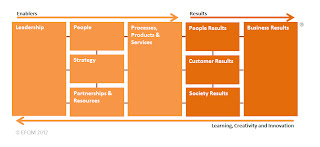Energy-efficient
In 2012
Improve4all provided sustainability support for the business of chip machine
producer ASML: the Sustainability Report 2011 was successfully completed. Eric
Meurice, President and Chief Executive Officer van ASML: ‘We see it as our
mission to develop machines that manufacture more efficiently integrated
circuits, which themselves will enable more energy-efficient electronic
products. Our sustainability strategy goes hand in hand with our business
strategy.’
EFQM-training
 |
| Working together on creative & inspiring solutions, to improve us all. |
An
excellent organisation requires an excellent approach. During the year Improve4all,
as member of the faculty of trainers, provided various EFQM-training courses
around the world. At the EFQM offices in Brussels, but also on location in Abu
Dhabi for instance, managers were trained in ‘the excellence practices’: how do
you determine if a business is organising its people and processes in an
optimal way? How does an organisation make sure that their business results are
balanced with their customer results, employee results and society results? And
which part are leaders playing here?
The journey
towards a sustainable world is not an individual journey, many, and each in
their own way, work at making the world a better place. Some are very
inspiring. Take John Elkington who, in his book The Zeronauts – Breaking the Sustainability Barrier, set the new
standard for sustainability this year. The idea is: the world is confronted
with some enormous challenges, better known as the 5 P’s: population growth,
pandemics, poverty, pollution, and proliferation. The only remedy for a healthy
future is to place our bets on an economy that grows without any negative impact
on the planet. In short: Zero Impact Growth.
Plans for 2013
This is
only a fraction of all beautiful experiences of the past year. In 2013 this
path will partly be continued: several training courses and assessments are on
the agenda, and for ASML the completion and publication of the Sustainability
Report 2012 is on there too. Next to this some new developments can be
reported: Improve4all will extend the European base (run from The Netherlands) and
also set up a hub in the Middle-East. Since the capacity will be enlarged there
will be room for new initiatives. So please feel free to spar and brainstorm,
who knows this might lead to sustainable insights …
Firm base
 Improve4all
is working on their next steps with the deeply rooted belief that truly
excellent organisations make the world a better place. By inspiring leaders to
find innovative and sustainable solutions for their organisations Improve4all
stimulates organisations to achieve and sustain outstanding levels of
performance. That is why, in 2013, we will strongly focus on sustainable
excellence again.
Improve4all
is working on their next steps with the deeply rooted belief that truly
excellent organisations make the world a better place. By inspiring leaders to
find innovative and sustainable solutions for their organisations Improve4all
stimulates organisations to achieve and sustain outstanding levels of
performance. That is why, in 2013, we will strongly focus on sustainable
excellence again.
But until
that time Improve4all wishes you a Merry Christmas and a Happy and Healthy New
Year!




















